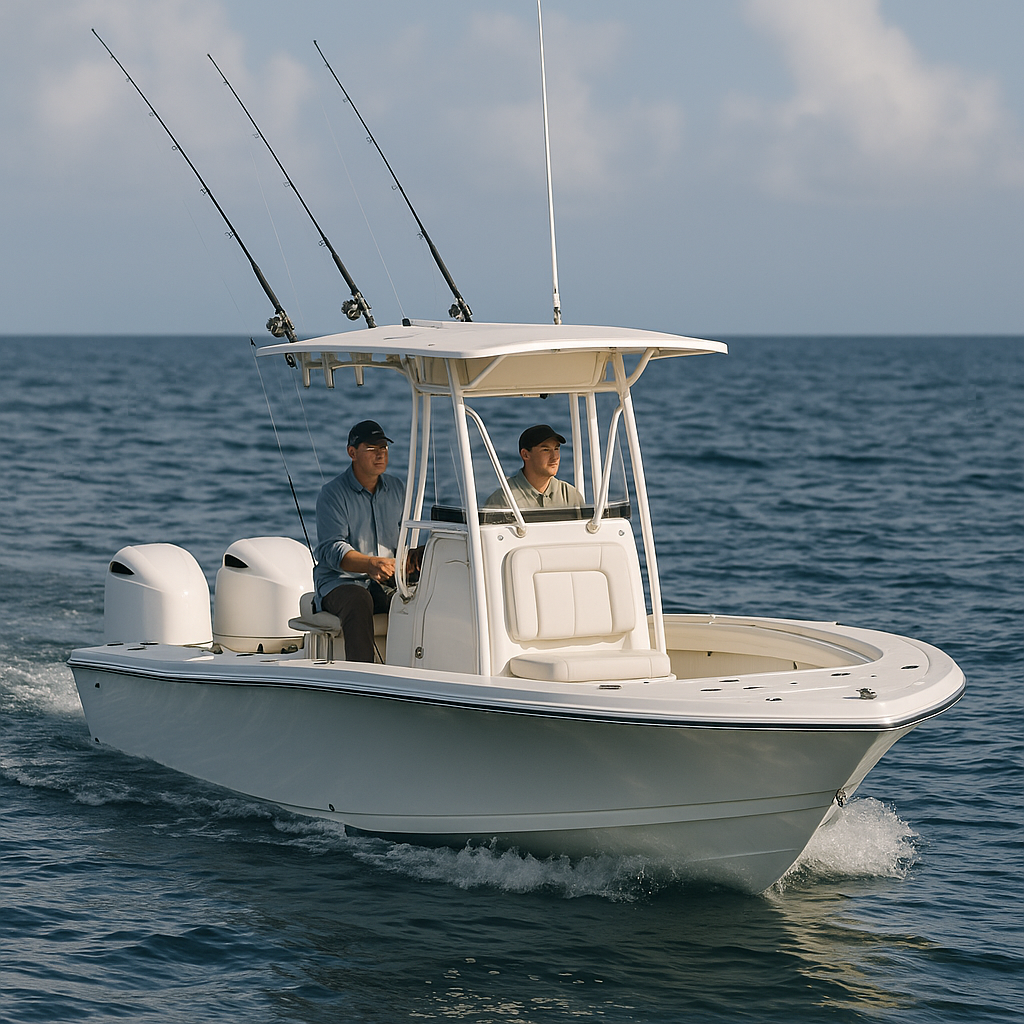Fishing from a boat offers a unique blend of relaxation and adventure. But honestly, even the calmest lakes or slow-flowing rivers hold some risks if you skip safety steps. After spending quite a few days out on the water, sometimes distracted by the next bite and other times scanning the horizon, I’ve learned that safe boating habits aren’t just boxes you tick. They shape every trip, and the longer I fish, the more I’m convinced that good habits make the day smoother and way less stressful.

Why Safe Boating Matters for Anglers
Every angler gets into it for different reasons. For me, it’s a blend of the chase, the quiet, and just being somewhere beautiful with a fishing rod in hand. There’s a real responsibility, though, when you’re boating, especially with friends or family along for the ride.
Accidents out on the water usually don’t happen because people ignore all safety advice; they occur because someone skips “just one” step or thinks rules don’t really apply that day. According to the U.S. Coast Guard, fishing is among the most common boating activities that lead to on-water incidents. Most of the time, it’s the simple things that get overlooked: someone leaves their life jacket stashed under a seat, or a thunderstorm rolls in faster than expected. I’ve run into both scenarios, and having a solid safety routine actually feels comforting rather than restrictive. Practicing safe boating really can mean the difference between an unforgettable trip and a sudden emergency.
Core Boating Safety Equipment You Really Need
Not all boats are equipped with gadgets, but there are some basics that should be on board every time, whether you’re a hobbyist or a pro. Here’s what’s always in my boat (and in my opinion, truly worth the space):
- U.S. Coast Guard Approved Life Jackets: One for each person, sized properly.
- Bailing Device or Bilge Pump: Even if you’re not expecting trouble, a five-dollar bucket is a lifesaver when you need it most.
- Throwable Flotation Device: I keep a cushion-type flotation device within arm’s reach because you never know how quickly a situation could escalate.
- Signal Devices: Whistle, air horn, waterproof flashlight, and flares for larger bodies of water. I find a little waterproof pouch for electronics keeps my phone and light dry.
- First Aid Kit: I use a dry box; it’s saved more than one day when someone has hooked themselves instead of a fish.
- Fire Extinguisher: If your boat has an engine, you’ll need one. This is especially important for any gasoline-powered vehicle.
Don’t Forget These Handy Extras
I also pack sunscreen, extra water, and a basic multitool or knife. I didn’t think about bringing those when I was new, but they’ve all come in handy more than once. A dry change of clothes, a simple waterproof map, and spare batteries for your electronics can really give a boost to your confidence and comfort if something goes wrong.
Pre-Trip Safety Checks for Fishing
Rushing to the water’s edge can mean missing small but crucial steps. Before I launch, I follow a fairly standard checklist. For me, it’s become as automatic as tying on a lure. Habit makes it easier to spot what’s missing before the boat leaves the shore. Here’s my simple pre-trip routine:
- Check the Weather: Even with apps and forecasts, things can change fast. I always glance at the radar and watch the sky, especially in unpredictable seasons. If there’s any doubt, I hold off or adjust my plans to avoid getting caught in rough conditions.
- Inspect the Boat: I look for loose fittings, old fuel lines, low battery levels, and ensure the drain plug is in place. It sounds obvious, but you only forget that once before you make sure to remember every time.
- Fuel and Engine Prep: Always know how much fuel you have and that your engine starts reliably before backing down the ramp. Double-checking connections and keeping a spare spark plug can save your outing.
- Share Your Plan with Someone: I usually text a friend or my spouse. Nothing fancy, just a note about where I’m going and when I expect to be back. This makes it much faster for someone to check in if something hasn’t gone as planned.
- Safety Gear Review: I quickly check all my safety gear and stash the life jackets where everyone can see and grab them. Easy access is key when the unexpected happens.
Top Safe Boating Habits for Anglers
I didn’t pick up all these habits overnight. But after a few weird close calls, like rogue waves, suddenly foggy mornings, and one time when my anchor stuck hard in the current, these are now part of my routine:
- Stay Sober on the Water: Alcohol and boating truly don’t mix, and the statistics back this up. I wait until the end of the trip to crack open a cold one. Even being a little distracted makes a big difference in balance and judgment on water.
- Watch the Weight: Too much gear or too many people on one side of the boat can cause it to tip over quickly. Distribute gear evenly, and stay seated when moving, especially on smaller or skiff-type boats.
- Mind the Weather: I keep an eye out for changing wind, clouds, or temperature drops. Sudden weather changes can be hazardous for smaller fishing boats, so staying vigilant is always worthwhile.
- Wear Your Life Jacket (Seriously): It’s so tempting to just sit on it, especially in the summer. But accidents don’t announce themselves. Slipping on rocks at launch or falling overboard while handling a big fish both happen more often than you’d think.
- Stay Aware of Surroundings: Between tension on the line and a cooler full of snacks, it’s easy to zone out. I try to scan for other boats, submerged logs, and changing water conditions a few times every hour, even on familiar lakes. Noticing fishing spots and navigation markers can help avoid collisions and make the trip more enjoyable.
What to Do if Things Go Wrong
Most boating problems feel like they only happen to “other people” until they show up in your lap. Once, my outboard died miles from the ramp, and another time, I helped an angler who’d knocked himself overboard when his rod snapped under strain. So, I’ve gotten a little less casual about being prepared for minor emergencies. Here’s what I keep in mind:
- If the Boat Swamps: Stay with the boat if possible. Most small boats and even kayaks will stay afloat, giving you visibility and something to hold onto. Floating next to the ship is usually safer than trying to swim to shore unless you’re very close and conditions are calm.
- Man Overboard: Toss a flotation device immediately. Get others to help keep an eye on the person, and don’t jump in after them unless necessary; you can both end up in trouble.
- Loss of Power: Always have a paddle (even with a motor). Drop anchor if you’re drifting into rocks or a channel, and use your phone or radio to call for help if needed. A whistle or air horn can also attract attention over distance if electronics fail.
If you’re unsure about what to do, focus on staying calm and relying on your fundamentals. Sometimes it really does come down to common sense and keeping your head. Take a moment to assess the situation, and remember that safety comes first, even if it means cutting the trip short.
Common Fishing Boating Challenges
- Hook Injuries or Fish Spines: I’ve seen more people hurt landing a panicked catfish than slipping on deck, so eye protection and being careful with nets are more helpful than some folks expect. A small pair of pliers can help remove hooks safely.
- Troublesome Anchoring: Fast currents or muddy bottoms can make anchors unreliable. Ensure your anchor is suitable for your boat and the water depth, and always secure the rope ends to prevent loss. Sometimes a little patience and a second try are needed.
- Sun and Heat: Long days on the water can sneak up on you quickly. Protective clothing, hats, and drinking plenty of water keep me fishing longer without feeling wiped out later. It’s also smart to take breaks in the shade when possible and reapply sunscreen regularly to avoid sunburn. Heat-related stress is a genuine concern—listen to your body and rest when needed.
Beyond these, tangled lines, sudden weather changes, and even running out of bait can throw off your adventure. Bringing backup supplies and being prepared to improvise helps keep your trip smooth.
Smart Boating Practices for Special Situations
- Night Fishing: Extra lighting, reflective tape, and staying in known waters add peace of mind. I avoid moving at speed after dark as much as I can. Glow sticks and boat navigation lights make a big difference.
- Saltwater Trips: Tides matter. I always note the peak tide times and ensure that navigation lights function properly in foggy ocean conditions. Salt spray can also affect gear; a quick rinse when you’re done helps your equipment last.
- Kayak or Canoe Fishing: I double-check that everything (paddle, tackle box, even the anchor) is tied down or floats. Staying visible with a flag or bright clothing is also helpful in busy areas. In tight spaces, a whistle can alert others to your presence.
In any less usual situation, preparation and caution go a long way. Taking extra time to plan can make your day less stressful and more rewarding, whether fishing in unfamiliar waters, participating in tournaments, or taking kids out for their first fishing day.
Fishing Safety
Frequently Asked Questions
-
What’s the most important safety item to bring for fishing trips?
For me, a properly fitted life jacket tops the list every time. If you need it, you don’t get a second chance to put it on. I also never fish without a basic first aid kit. Those two items raise your odds when surprises happen. -
How can I stay safe if I’m fishing alone?
I tell someone my launch point and return time. I keep my phone charged in a waterproof bag. I also know my comfort level on the water. A short trip is fine if that’s what I’m ready for. -
Should I take a boating safety course as an angler?
Yes. It’s a smart move, especially if you’re new. Many states require it for boaters. I learned a lot about navigation and emergencies, even after years on the water.
Final Thoughts
Sticking to smart, safe boating practices doesn’t slow down the fun; if anything, it keeps your trip relaxing instead of stressful. With a good mix of gear, prep, and habits, you’ll spend less time worrying and more time actually fishing, which is the whole point. A little practice and planning go a long way toward making fishing memories worth keeping. Grab your gear, pack your patience, and enjoy the water, knowing you’re well prepared for whatever the day brings.
